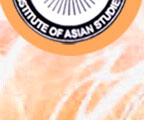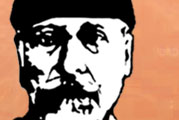The Maulana Abul Kalam Azad Institute of Asian Studies was set up at the joint initiative of the Government of India, Department of culture, Ministry of Human Resource Development and the Government of West Bengal. Registered as a Society under the West Bengal Registration of Societies' Act of 1961, with Prof. Nurul Hasan, the then Governor of West Bengal, as the President of the Society on the 4th of January 1993. It is funded by the Department of culture, Government of India. Presently, His Excellency, Governor of West Bengal, is the President of the Society. An acre of land in Bidhannagar (Salt Lake City), Kolkata, was allotted to the Institute by the Government of West Bengal for building the Institutes campus.
The Foundation Stone of the Maulana Abul Kalam Azad Institute of Asian Studies Salt Lake campus was laid by the then Hon'ble President of India, Dr. Shankar Dayal sharma, on the 12th of March I993, in the presence of the then HRD Minister Shri Arjun Singh and the then chief Minister of West Bengal Shri Jyoti Basu. The Salt Lake campus is expected to be fully operational at the end of 2009. Currently, the Institute is located in the former residence of Maulana Azab at Ashraf Mistry Lane.
The Memorandum of Association envisaged the objectives of the Institute as follows:
The Maulana Abul Kalam Azad Institute of Asian studies is a centre for research and learning with focus a on social cultural, economic and political / administrative developments in Asia from the middle of the 19th Century onwards with special emphasis on their links with India, and (b) on the life and works of Maulana Abul Kalam Azad.
Till date, the emphasis had been on specialising on modern and contemporary affairs in South Asia, central Asia and West Asia, and carrying on area studies on the five Central Asia Republics of the former Soviet Union (Uzbekistan, Turkmenistan, Tajikistan, Kazakhstan and Kyrgyzstan), Turkey, Iran Afghanistan and Bangladesh. The Institute now looks forward to widening its area of study to the Northeast region of India, Southeast Asia and China;
To establish and maintain a library of books, pamphlets, newspapers, periodicals, microfilms, still photographs, motion pictures, sound recordings and other materials baying a bearing on the secular traditions of Modern India;
To establish and maintain a personalia Museum at the former residence of Maulana Azad in Calcutta. The Museum would highlight the life and works of Maulana Abul Kalam Azad as a distinguished national leader and thinker;
To make available to the public in a suitable place the collections f papers and library sources for study and research.
To organise, undertake, conduct, encourage and promote study and research in the field of secularism and universal brotherhood and the life and work of Maulana Azad;
To sponsor or commission studies, based on original research or translation or compilation and for this purpose, to pay honorarium or remuneration or royalty, or to make payments for the acquisition of copyright of works already published To undertake and to promote publication of books, monographs, periodicals and papers incorporating the results of the studies and research carried out in the Institute and / or any other place as the Institute may decide;
To foster academic contacts within India as well as in other countries through exchange of personnel and research materials;
To collaborate with institutions engaged in similar activities in India and abroad with a view to further the aims and objects of the Institute;
To institute and award fellowships, scholarships and monetary assistance in accordance with the rules and byelaws;
To undertake all such activities as are incidentally necessary or conducive to the attainment of all or any of the above mentioned objectives.
To create and institute administrative, ministerial, technical, research and such other posts as may be necessary and to make appointments, thereto, in accordance with the Rules and Regulations of the society, subject to any directions, that maybe issued by the central Government from time to time; To obtain or accept grants, subscriptions, donations, gifts, requests from Governments, Corporations, Trusts or any persons for the purposes of the Society;
To draw, make, accept, endorse and discount chequest, notes or other negotiable instruments and1 for this purpose, to sign, execute and deliver such assurances and deeds as may be necessary for the purpose of the Institute;
To acquire, bolt and dispose off property in any manner1 whatsoever, for the purpose of the Institute, provided that prior approval of the central Government is obtained in the case of acquisition or disposal of immovable property;
To deal with property belonging to or vested in the Institute in such manner as the Institute may deem fit for advancing the functions of the Institute;
To borrow and raise money, with prior approval of the central Government, with or without security or on the security of any Mortgage charge or Hypothecation of pledge over all or any of the immovable properties belonging to the Institute or in any other manner whatsoever for the purpose of the Institute;
Dr. Shankar Dayal Sharma, the then President of India, laid the Foundation Stone during March 1993 for the building. Due to administrative reasons, the plot could be registered only in 1997. However all efforts are being made to complete the building by December, 2007.
To build, construct and maintain houses, hostels, or other buildings and alter, extent, improve, repair, enlarge, or modify the same with light, water, drainage, furniture, fittings, instruments, apparatuses and appliances and other things for the use to which such buildings are to be put or held in connection with objects of the Institute;
To construct or otherwise acquire, layout, repair, extend, alter, enlarge, improve and use any land, park and any other immovable property belonging to or held by the Institute;
To appoint committees or sub-committees as it may be deemed fit to carry out the objectives of the Institute; To delegate any or all its powers to the Executive Council or to any of the committees or sub-committees constituted by it;
To do all such lawful acts and things, whether incidental to the powers aforesaid or not, as may be requisite in order to further the objects of the Institute as a Centre for study and Research;
The studies and research programmes conducted by the Institute shall be open to persons of either sex and of whatever race, religion, creed, caste or class and no test or conditions shall be imposed as to religious belief or profession in admitting or appointing members, scholars, workers or in any other connection whatsoever, and,
No benefaction shall be accepted by the Institute which, in its opinion, involves conditions or obligations apposed to the spirit and objects of the Institute.
One of the important objectives of the Institute is to promote a study of Modern and Contemporary Asia with primary focus on social and cultural movements and India' s relations with, the neighbouring Asian countries.
The Institute has concentrated on Central Asia as a priority area for its research, Need less to say, the Central Asian region has acquired a great significance for India in view of our traditional, historical and cultural ties and its increasing importance as a potential source of energy aud other important minerals as also in the context of an intensified international rivalry over this region in our neighbourhood in the wake of disintegration of USSR of late, forces inimical to our national interests have become active in this region with, a view to acquiring a strategic depth.
Under the North-East Programme of the Government of India, the Institute has launched over twenty research projects since the year 2000 in the North,-East part of the country on a variety of themes including the study of the society and culture of the tribals of the North - East region, problems of insurgency, trafficking in drugs and narcotics, illegal arms trade, etc.
The Institute has been ranked as one of the "Centres with Potential" in a report prepared for Research Councils, UK, by the India Foundation For The Arts, Bangalore, in June 2010. titled “Arts and Humanities Research Mapping, India – An overview of the arts and humanities research landscape in India: Mapping the centres of excellence, potential funders, emerging themes, strengths and weaknesses”.
Read Full Report here...






